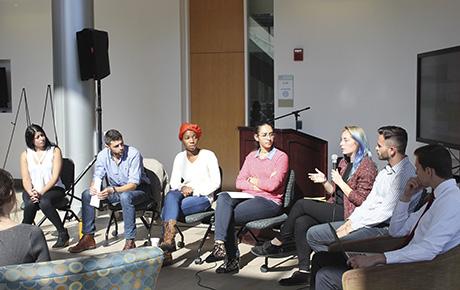Alan G. Hassenfeld, the retired chairman and CEO of Hasbro Inc., came to Roger Williams University in May to hear about the community projects that RWU students are undertaking with the help of a $500,000 gift from Hassenfeld Family Initiatives LLC.
Kelsey Rogers ’17, one of the seven students in the inaugural group of Hassenfeld Student Leadership Fellows, told Hassenfeld about her work as founding president of the Food Recovery Network on campus. Since its inception in April 2014, the RWU chapter of the Food Recovery Network has collected more than 20,000 pounds of extra food from campus dining halls and provided it to local shelters, she said.
“That would have either been composted or ended up in a landfill, which is obviously a major environmental concern,” Rogers said. “It makes a difference in the community because we are going to these shelters and we are actually putting the food in the fridge. We have a relationship with the people that are benefiting from the food we are bringing.”
For instance, one of the shelters is for battered women and their children, she said. “So many times when we get there, it’s kind of late, but if there are kids still awake, that is the best thing ever because they get so excited. We are seeing those faces of people benefitting.”
Hassenfeld asked what will happen to the Food Recovery Network at RWU once Rogers graduates.
Rogers said the organization (which works in conjunction with Bon Appétit, RWU’s food service provider) has attracted about 100 members and has a strong leadership team. “So I have no doubt it will continue on,” she said. “We have so many faculty who have been completely immersing themselves in this program to make sure it continues.” And, she said, the group has been reaching out to other colleges and universities in Rhode Island to try to make it a statewide program.
Arlene Violet, a RWU trustee who is a former state attorney general and a former nun, told Rogers that she appreciates the organization’s effort to encourage students to avoid wasting food. “It’s making people conscientious about food and people not having food,” she said. “That must be the nun part of me, but it’s this whole business of: ‘Go up for seconds if you are still hungry — but don’t waste food.’ ”
Hassenfeld also heard from Krystal Cardin ’18 about the graphic design work that RWU students did for the Pawtucket Central Falls Community Development nonprofit, which develops and manages affordable housing.
Also, RWU architecture school dean Stephen White and architecture students Meghan Roscoe and Annalisa Baci told Hassenfeld about urban forestry and tree mapping programs made possible through the Hassenfeld projects. They detailed work done with the Bristol Conservation Commission and the Roger Williams University Arboretum.
RWU President Donald J. Farish told Hassenfeld that his generous donation is helping to bolster and extend the university’s commitment to community-engaged teaching and learning. “Part of an education is learning how to be effective in helping the world be a better place and helping to change the world,” he said. “So rather than sort of study it inside the classroom, how about getting out into the community?”


